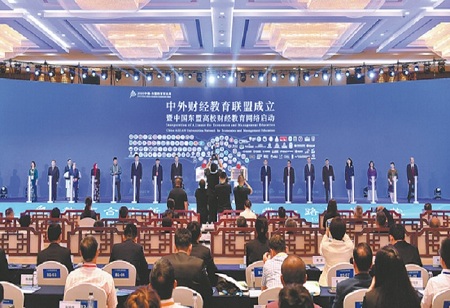"The fast advancement of artificial intelligence has prompted a revolutionary shift in the banking and economics sectors," Zhao Zhongxiu, president of the University of International Business and Economics, stated. "It has also had a significant influence on educational institutes specialized to finance and economics." The Alliance for Economics and Management Education (AEME) and the International Forum on Higher Education for Economics and Management Talents in the Age of Artificial Intelligence convened their first plenary meeting in Guiyang, Southwest China's Guizhou province. This new reality emphasizes the importance of establishing the AEME, a development supported by the Central University of Finance and Economics. According to Chen Jie, China's vice-minister of education, the goal is to "encourage universities to enhance collaboration and integration among various academic disciplines, exchange knowledge and expertise, facilitate the convergence of artificial intelligence with traditional financial and economic fields, and participate in building a robust ecosystem for high-quality artificial intelligence financial education."
AEME's membership includes 121 local institutions and enterprises, as well as 24 international universities from the United States, the United Kingdom, Greece, Australia, Singapore, and Argentina. The discussion and forum were part of the 2023 China-ASEAN Education Cooperation Week, which took place from August 28 to September 2 and with the topic "New Vision for Education Cooperation, Shared Prosperity for the Belt and Road. Professor Leonidas Anthopoulos of Greece's University of Thessaly stressed AI's transformational potential in education. "AI is something that may be beneficial, and it clearly affects the way education works, particularly in finance, science, and associated subjects," he stated. "We need to understand how AI can be used." According to Ma Haitao, president of the Central University of Finance and Economics, the burden of fully investigating the potential of AI rests on the shoulders of present higher education recipients since they grew up in the internet era and are more familiar with associated technology. This means that colleges' techniques for fostering financial and economic talent must be revised.
"We need to change our approach to talent development by enhancing students' personal value and potential for continual learning," Ma stated during his keynote address at the event. "We should also promote the integration of subjects, majors, and courses by encouraging the merger of diverse academic fields and maintaining a systematic and comprehensive development strategy." Professor Ufuk Gunes Bebek of the University of Birmingham in the United Kingdom concurred. "We must prioritize establishing a functioning connection above strict management systems, contrary to normal ways of creating partnerships," he stated. "We must embrace our diversity since they are our fundamental sources of power. China's education minister, Huai Jinpeng, emphasized the common difficulties that humans confront in today's world, such as climate change, energy crises, public health, and, of course, the threats posed by artificial intelligence. Furthermore, he underlined the need to develop new talent capable of dealing with future uncertainties and problems. "In the future, China is willing to collaborate with ASEAN nations to contribute talent and innovation to the Belt and Road Initiative through high-quality education development,"

